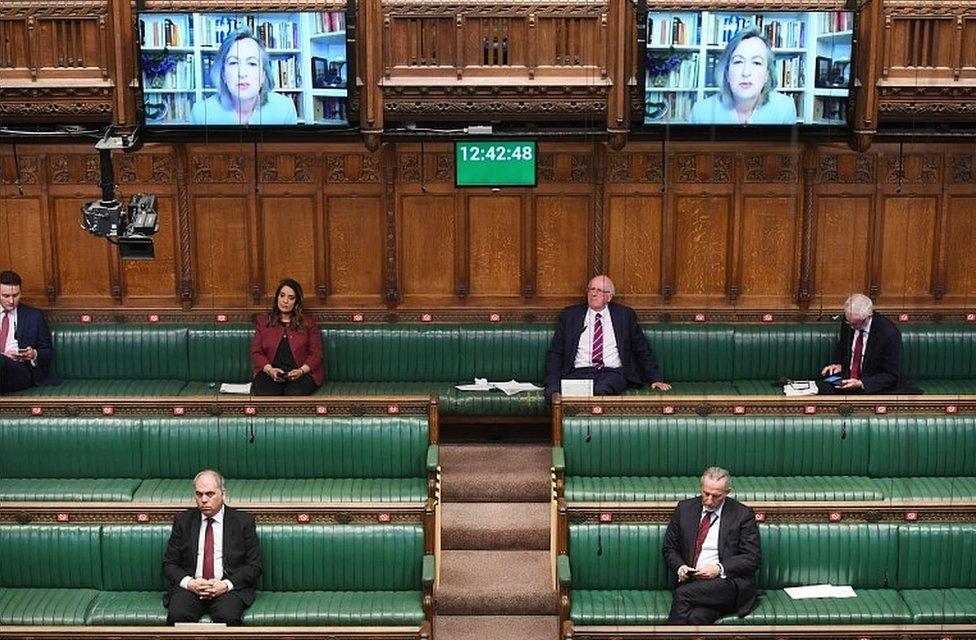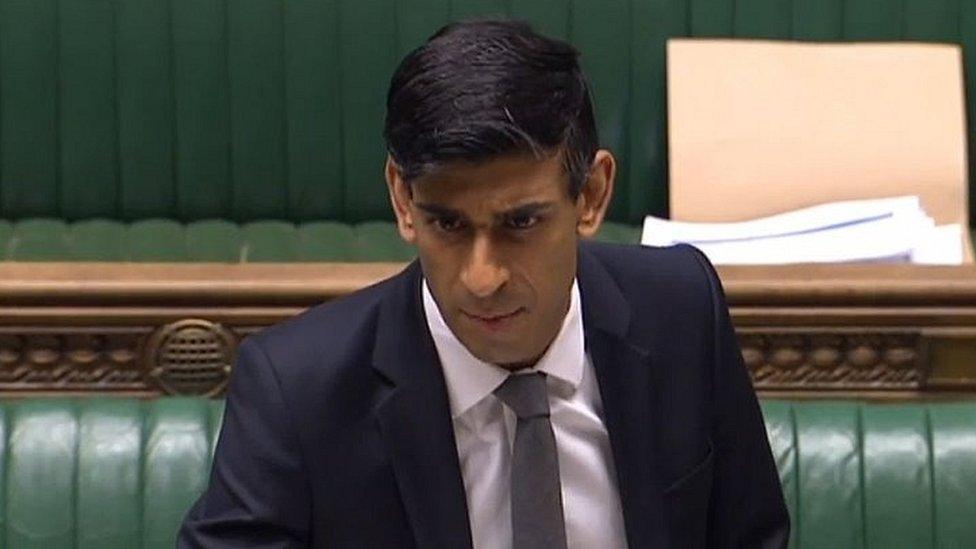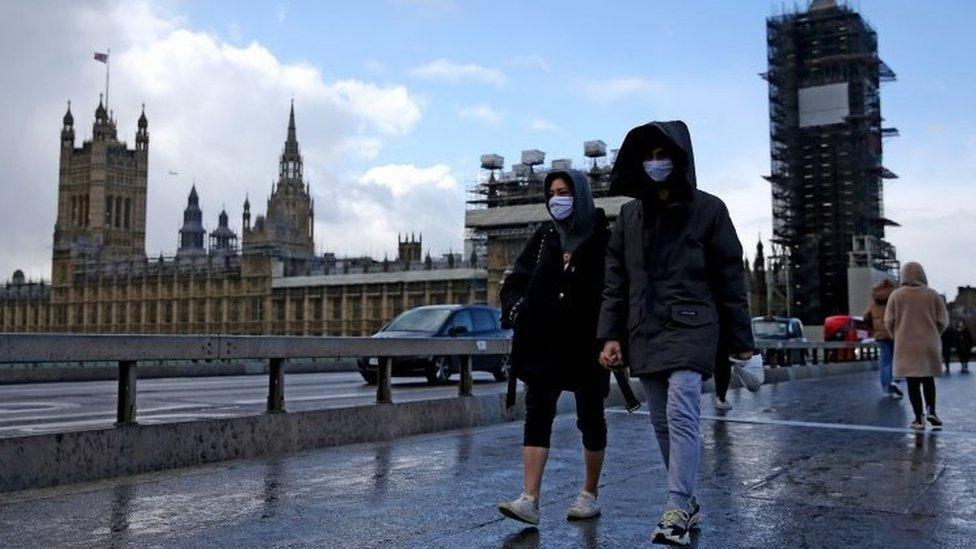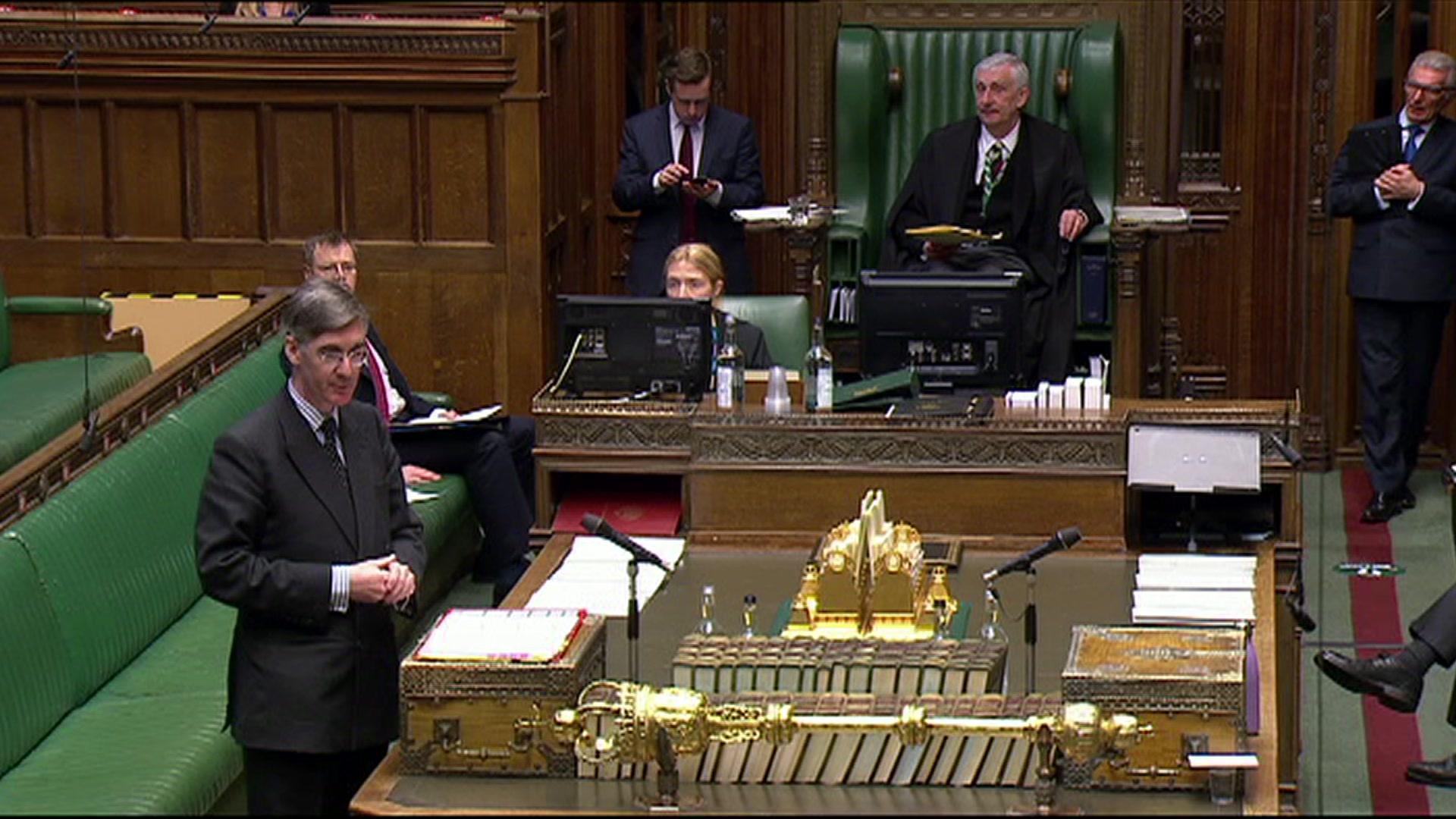The week ahead in Parliament
- Published

The combination of an overwhelming national crisis and the technological limitations of the new model virtual Parliament have made Westminster a very different place.
Party politics is an undercurrent rather than a riptide. MPs are strongly discouraged from coming in, and the resulting virtual question times and statements are very different.
And until a remote voting system is in place, the parties are cooperating to avoid anything being forced to a vote.
So a parliament that for centuries has been based on party conflict between MPs who are physically present is feeling its way.
Tax clampdown
The coming week sees important legislation, but legislation the opposition can vote for, or at least not oppose, at the "in principle" Second Reading stage of consideration.
The Finance Bill, which enacts the measures announced in the Budget, the Domestic Violence Bill, and the Fire Safety Bill are all down for Second Reading this week, while the Immigration Bill, which the opposition parties would certainly have wanted to vote against, is not.
Of course, MPs from both sides may have issues of detail to pursue, but the bills down for Second Reading seem unlikely to be blocked at this stage - even if potential dissidents might have to stretch a point to let them proceed.
But look out for amendments further down the line, especially once a remote voting system is in place. The Finance Bill, in particular, could well provide an opportunity for the-cross party group pushing for a clampdown on tax avoidance to target tax-avoiding companies now asking for a government bailout - keep an eye on the likes of Labour's Dame Margaret Hodge and Conservative Andrew Mitchell.

Rishi Sunak is set to make a statement on loans for businesses affected by coronavirus
But the main events of the next few weeks are unlikely to be legislative, at least until intensive efforts to provide a watertight remote voting system are in place.
Fresh from its success in making virtual question times possible, Parliament's digital team believes it is close to rolling out a voting system which would allow votes on the Immigration Bill and on abortion in Northern Ireland as soon as early May.
Trials revealed problems with the system which have now been tackled, and MPs will be offered a way of voting online, based on the existing Members Hub, which already allows them to put down questions online.
They will be alerted when a division is taking place, via text messages and emails, and once they have voted Aye or No, they will receive a message confirming their vote, after which they will have 15 minutes to change it, if they've made a mistake.
Limited slots
Incidentally on Friday's Today in Parliament, Mr Speaker Hoyle hails Parliament's digital team as "the real stars of the show" for making the virtual Commons possible at all, and no-one should underestimate the scale of its achievement in providing an online upgrade to the procedures of a venerable, centuries-old institution.
In the absence, for now, of contested votes, ministerial statements and ministerial interrogations before the Commons or its committees are where the headlines will, most probably, be generated - starting with Chancellor Rishi Sunak making a statement on the Coronavirus Large Business Interruption Loan Scheme on Monday. The new shadow chancellor, Anneliese Dodds, makes her Commons debut in the role.
The sheer scale of the pandemic crisis means it touches almost every aspect of government - everywhere there are questions to be answered and crises to be addressed, so almost any appearance by a minister could make the headlines.
And appearances before select committees are spread out through the week - the capacity constraints for holding virtual meetings mean there are a limited number of slots, and so the once rare treat of a Thursday, or even Friday hearing is now commonplace.
Here's my rundown of the week ahead:
Monday 27 April
Unusually, the Commons opens (14:30) with two sets of departmental questions - first half an hour of Justice Questions, postponed from the week before, and then half an hour of Digital, Culture, Media and Sport Questions.
After that, there will be that ministerial statement from Rishi Sunak on the Coronavirus Large Business Interruption Loan Scheme, and perhaps further statements or urgent questions.
MPs then move on to the Second Reading debate on the Finance Bill - which, under the terms of the business motion they will be asked to agree, will last for two hours.
In normal times there would be a fair amount of dissention and debate, but while this Finance Bill does contain important changes on the controversial Loan Charge and on digital services taxes, the main focus of debate looks likely to be the state of the economy given the extraordinary effects of the pandemic, and Labour will not be looking to force anything to a vote at this stage (the Committee Stage consideration of the bill may be another matter).
It's a busy day on the (virtual) Committee Corridor. My pick of the hearings are the Public Accounts Committee session on gambling regulation, problem gambling and protecting vulnerable people (14:00) and the Brexit Committee session (14:30) with Michael Gove, the Chancellor of the Duchy of Lancaster, on the negotiations on the UK's future relationship with the EU
The Lords isn't sitting, but the there is a private meeting of its administrative arm, the House of Lords Commission, which will consider the expenses system for virtual working by peers. With rising hostile comment about the idea of Noble Lords claiming a full £305 daily attendance allowance without leaving their living rooms, expect the commission to pare down the allowances.
Tuesday 28 April
There's another double question time in the Commons (11:30), with MPs first quizzing Attorney General Suella Braverman, then Housing, Communities and Local Government Secretary Robert Jenrick. More ministerial statements and urgent questions may well follow.
The main legislative business is the Second Reading of the Domestic Abuse Bill, postponed since before the general election. The bill brings in new protections for victims, including Domestic Abuse Protection Orders and Protection Notices, which can be used to impose long-term bans on perpetrators making contact with the victim. The latest incarnation includes new measures, such as requiring councils in England to provide support and safe accommodation for victims and their children.
The day's select committee action includes the new Defence Sub-Committee, tasked with looking at the security of the UK's new 5G network (09:00), taking evidence from expert witnesses, and the International Development Committee (14:00) quizzing minister James Cleverly on the effectiveness of UK aid.
In the Lords (13:00) questions to ministers include the Conservative former sports minister Lord Moynihan asking about funding for potential Olympic and Paralympic athletes up to the 2021 Games in Tokyo and Labour's Baroness Hayter asking about progress in the negotiations on the future relationship with the EU.
The day's main legislative work is the Second Reading of the Prisoners (Disclosure of Information About Victims) Bill also known as Helen's Law, which would ensure that murderers and paedophiles who refuse to disclose information about their victims pend longer behind bars. The law is named after Helen McCourt, who was murdered in 1988 but whose killer has never revealed her body's location.
Wednesday 29 April
The Commons opens (11:30) with half an hour of International Development Questions, followed by Prime Minister's Questions - probably, following the previous week's precedent, extended to 45 minutes, to allow for the more cumbersome nature of a virtual Commons.
After that, MPs more on to the Second Reading debate for the Fire Safety Bill, a post-Grenfell measure which imposes new obligations on the responsible person or duty-holder for multi-occupied, residential buildings to manage and reduce the risk of fire. The bill also provides powers to bring in regulations to implement the recommendations from the Grenfell Tower Inquiry phase one report, which called for building owners and managers of high-rise residential buildings to be made responsible for regular inspections of lifts, evacuation plans and other fire safety issues.
There is a lot of important select committee activity, not least the long-awaited debut of Home Secretary Priti Patel before the Home Affairs Committee (10:00) to talk about Home Office preparedness for coronavirus.
Meanwhile, Education Secretary Gavin Williamson is before the Education Committee (09:00) talking about the impact of Covid-19 on education and children's services, and the Treasury Committee (14:00) takes evidence from Chief Secretary to the Treasury Stephen Barclay on the economic impact of coronavirus, focusing on the operational effectiveness, cost and sustainability of the government's and Bank of England's support packages.
Finally, the slightly unpromising looking Public Administration and Constitutional Affairs hearing on the work of the Cabinet Office, starring Michael Gove (13:45) could be worth a look. The Cabinet Office is the engine room of government, and there will be plenty of scope to probe the planning for the pandemic, and the preparations put in place (or not) in the wake of the 2016 Exercise Cygnus, which modelled the UK response to a pandemic.
In the Lords (11:00) questions to ministers include Labour's Lord Berkeley on imposing a condition for companies receiving of state support due to Covid-19 not to use artificial tax-avoidance arrangements. As I write, there is no legislative business listed.
Thursday 30 April
The Commons is not sitting, and, as I write, there is only one Commons select committee meeting scheduled - the Northern Ireland Affairs Committee (14:30) taking evidence on Northern Ireland and customs arrangements after Brexit.
The Lords, however, is sitting (11:00), with ministers facing questions protecting the prosperity and wellbeing of UK citizens from the pandemic, the ongoing conflict in Idlib, Syria, and the money disbursed by British Business Bank to financial institutions in order to support businesses through the pandemic.
That is followed by debates led by backbench peers on the challenges facing the charitable and voluntary sector, during the Covid-19 pandemic, and on support for people who're living in poverty or are unable to meet their basic needs, as a result of Covid-19.
Friday 1 May
Neither House is sitting, but the Commons Health and Social Care Committee (09:15) takes evidence on delivering core NHS and care services during the pandemic and beyond.
- Published2 April 2020

- Published21 April 2020

